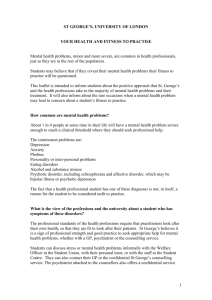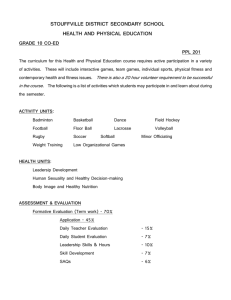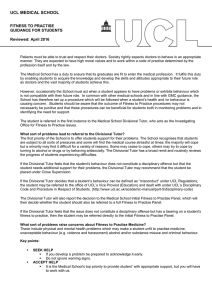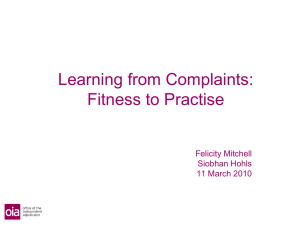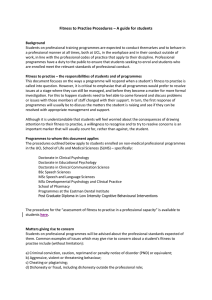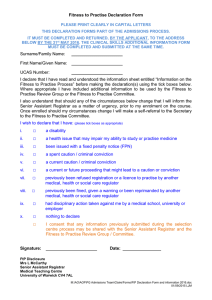The Health and Care Professions Council
advertisement
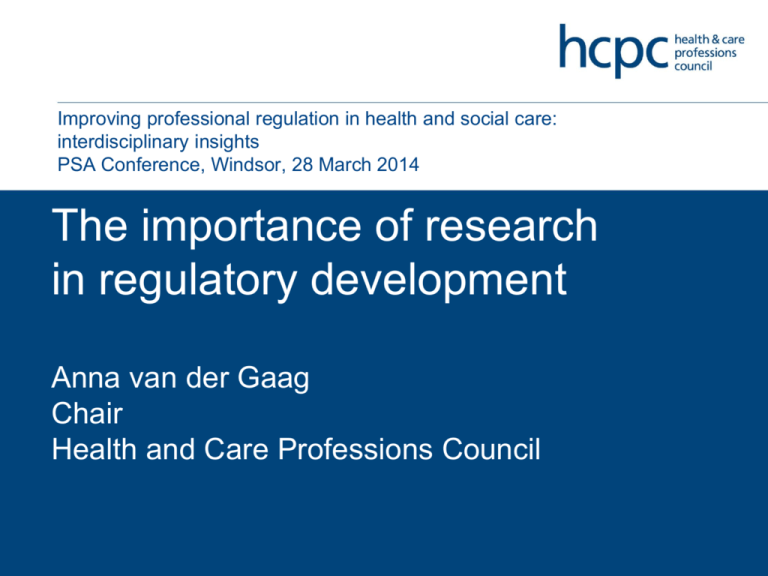
Improving professional regulation in health and social care: interdisciplinary insights PSA Conference, Windsor, 28 March 2014 The importance of research in regulatory development Anna van der Gaag Chair Health and Care Professions Council Outline • What are the drivers for change? • Some examples of the impact of research in regulation • Looking to the future The Health and Care Professions Council • UK wide regulator of 16 health, psychological and social work professions • Purpose: “to safeguard the health and well-being of persons using or needing the services of registrants” – Article 3(4) • Work overseen by Professional Standards Authority for Health and Social Care (PSA) or ke rs i Ph n E O ng cc ys la up io n th at er d io ap na is lt ts he ra Ra Bi pi st om dio g ed ra s ph ic al er Pr s s ci ac Sp e t nt ee iti Pa is on ch ts r e a an rp m d ed sy la O ic c pe Ch ng ho s ua ra l i o r tin op g gi st g o d e th s de is er pa ts a rtm / p pis ts od en i at tp ris ra ts ct i ti on e Cl Di rs in et iti ic al an sc s ie He Ar nt ts ar is in th ts g e r ai ap d is di ts s pe Pr os ns O th rth ers et is op ts tis /o ts rth ot is ts So ci al w HCPC Register 321,735 registrants from 16 professions (3 February 2014) 90,000 80,000 70,000 60,000 50,000 40,000 30,000 20,000 10,000 0 What are the drivers for change? Drivers for change political context research practice Policy change Source: Overseas Development Institute circa 1999 Drivers for change in regulation Political context Research Health and care practice Regulatory change Evidence based health and social care A strong imperative to deliver evidence based care Shouldn’t regulators do the same? Research methodologies in regulation Descriptive ++++++++++++++ Longditudinal ++ Qualitative ++++++++ Quantitative +++++++ Mixed methods ++++ Randomisation ? (Could be applied in a study of the impact of continuing fitness to practise). Evidence based regulation HCPC’s strategic objective (2009) To build the evidence base of regulation Commissioning Dissemination Improvement in our processes www.hcpc-uk.org/publications/research Examples of research in regulation Meaning and mechanisms • Understanding the fitness to practise experience • Service user involvement in education • Service user feedback tools • Student fitness to practise • Public awareness • Costs of regulation Fitness to Practise Expectations of the fitness to practise complaints process (IPSOS 2010) Led to changes in our literature and communications changes to the process and influenced our thinking on mediation and its role in regulation www.hcpc-uk.org/publications/research Professionalism • What is perceived as ‘professionalism’? • Students and educators • Chiropodists / podiatrists, occupational therapists and paramedics The nature of competence “The way competence has evolved is as a measurement. It has been stripped away from the constructs of care, motivation and confidence. In Ontario, pharmacists are measured on one day, a six hour assessment. Does this mean they are competent? Professor Zubin Austin HCPC seminar, 5 February 2014. The future? More transformative research • Regulators increasingly alert to the contribution of research • Emphasis must be on better understanding of the meaning and the mechanics of regulation Selected HCPC Research Reports Gulland, J (2008) Scoping report on existing research on complaints mechanisms. HPC (2009) Continuing fitness to practise; towards an evidence based approach to revalidation. Morrow et al (2009) Professionalism in healthcare professionals. Ipsos Mori (2010) Expectations of the fitness to practice complaints process. Irvine et al (2011) Alternative mechanism for resolving disputes: a literature review. Chisholm et al (2011) Service user feedback tools: an evidence review. Mitchell, L (2012) Student fitness to practise and registration: a literature review Moore et al (2013) Exploring views on the Fitness to Practise of health and care professionals www.hcpc-uk.org/publications/research Contact details anna.vandergaag@hcpc-uk.org @AnnavdG www.hcpc-uk.org Find us on www.facebook.com/hcpcuk Follow us @The_hcpc Follow us on www.linkedin.com Sign up for our RSS feeds www.hcpc-uk.org Sign up to our newsletter newsletter@hcpc-uk.org



